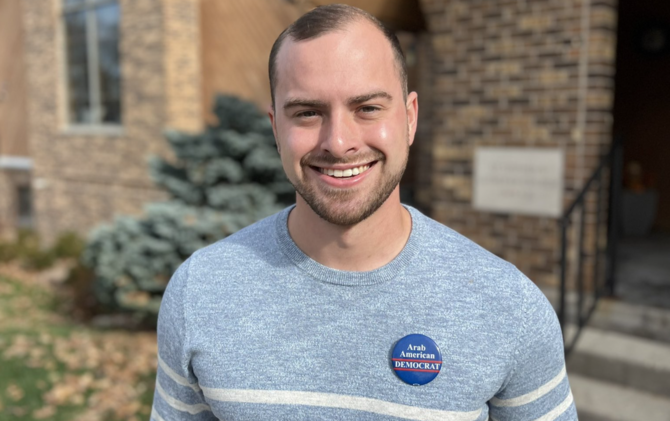WASHINGTON D.C.: In the US midterm elections this week, voters in Iowa for the first time in history elected an Arab American to represent them in the state’s General Assembly.
Democrat Sami Scheetz, a 26-year-old grassroots community organizer from the city of Cedar Rapids, defeated his Republican rival in Tuesday’s poll by a 30-point margin. He will be one of the youngest members of the Iowa state legislature.
His victory, in a state controlled by a republican majority at both state and national levels, will be seen as significant to efforts to promote Democratic Party agendas in the state.
After his victory was confirmed, Scheetz told Arab News that he is very proud and honored by the trust the community has placed in him to represent them in the Iowa State House.
“I feel amazing and grateful because this is the community I grew up in and where my family live,” he said.
“I feel honored to represent them and to be given the opportunity to work for them and fight for their causes and for every working family in my district.”
He added that his parents supported him throughout the campaign and are extremely proud of his achievement. His mother, Hala, emigrated to the US from Damascus, Syria, more than 35 years ago. His father, Raphael, is a native-born Iowan with German heritage.
“I am looking forward to working with Republicans and Democrats to build a more inclusive Iowa, with an economy that works for all people,” he said in a statement issued by his campaign.
Scheetz will represent the 78th District, which has a diverse electorate that includes large Latino, Arab American and African American communities, in addition to its white population. It also hosts large numbers of recent immigrants and refugees. Scheetz, who is fluent in Arabic and Spanish, vowed to represent all residents of the district equally and work to improve living standards.
He campaigned in particular on the issues of healthcare, education and workers’ rights. He told Arab News that the focus of his political and legislative agendas while in office will include protecting families and making sure that women continue to have a choice on the issue of abortion, especially in a heavily
Republican state such as Iowa. A recent Supreme Court ruling resulted in access to abortion being limited in many Republican-controlled states.
Scheetz, whose official swearing in will take place in January in the state capital, Des Moines, said he will also work to improve the education system and advocate for the introduction of universal healthcare to ensure everyone has proper, affordable access to medical treatment.
Scheetz predicted that Iowa could move toward Democratic control, given the rapid growth of its Latino community of Mexican Americans, who tend to be more progressive in their political views and traditionally support the Democratic Party. For that to happen, however, he said the party needs to work harder to convince the people of Iowa that it is committed to addressing the issues that matter most to them.
Statewide, Iowa has a sizable Arab American community that began to establish itself more than a century ago. Cedar Rapids is home to the Mother Mosque of America, which opened in 1934 and was the first mosque to be built in US.
The US midterm elections are held two years into each four-year presidential term. Traditionally, the party of the incumbent president tends to lose seats in the US Congress in the midterms, often by wide margins, a trend that has been observed since at least 1978.
This week, however, the Democrats performed better than many pundits expected; many had predicted the Republicans would easily take control of both houses of the US Congress relatively comfortably.
Though the full final results were still too close to call on Wednesday, the Republicans were expected to take control the House of Representatives but with a relatively slim majority that could complicate their ability advance their legislative agenda. The race for control of the Senate was even closer and could go either way.

























